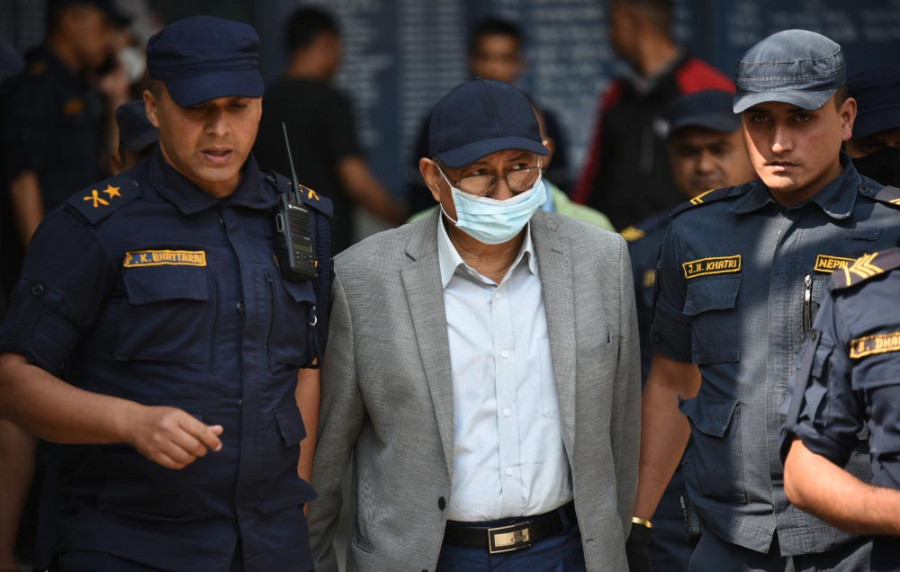Editorial
Skeletons tumbling out
Probe into the Bhutanese refugee scam needs constant vigilance from media and civil society.
The police quite efficiently detained former Home Minister Bal Krishna Khand on Wednesday morning in connection with the fake Bhutanese refugee scam, having earned widespread criticism and probably learnt a lesson from their lackadaisical approach to nabbing Top Bahadur Rayamajhi, former deputy prime minister and energy minister. Rayamajhi, a sitting lawmaker, is still absconding and has now submitted a leave of absence from Parliament on medical grounds. Rayamajhi’s party, the CPN-UML, has finally suspended him after sensing a clear sign that the public is getting restive due to its apparent attempts to save him and realising that Rayamajhi too would soon be arrested. Having defended Rayamajhi for a whole week, UML chair KP Sharma Oli seems to have given up, considering how Khand, the leader of the ruling Congress, has found himself in the police net.
A nervous Arzu Rana Deuba, who has been named by an accused in a leaked tape—whose veracity is yet to be established—as one of the co-conspirators in the scam, stood up in Parliament earlier this week, waxing eloquent about her victimhood as a woman politician, claiming she was being hounded by the patriarchal political class. It cannot be a coincidence that apart from Rana Deuba, another person named in the leaked tape is Manju Khand, lawmaker and wife of Bal Krishna Khand. Now that the former minister has been detained and produced before the court, the police will be expected to keep the twin woman leaders of the Congress under the radar of investigation.
The spectacle of arrests, abscondings and accusations around the state-sponsored manufacture of fake Bhutanese refugees in Nepal is getting more dramatic by the day. As Nepal Police widens its net, the skeletons hidden in the closets of the political class are tumbling out, one after another, and the people, relieved that some big fish are being caught, eagerly wait to see the much-awaited dismantling of the network of corrupt and powerful leaders. Yet Nepalis are not surprised to learn of the involvement of the top leaders of major parties. For them, it seems, the recent spate of arrests is just a déjà vu in a political culture that reeks of corruption from top to bottom.
The back-to-back meetings of the triumvirate of Prime Minister Pushpa Kamal Dahal, Congress President Sher Bahadur Deuba and UML chair Oli indicate the roots of the scandal run wide and deep, and the consequences of a full-fledged investigation could be collectively devastating for their parties. This is also a possible sign that the leaders will conspire to systematically dismiss the matter after the initial spate of arrests, as the money trail of the refugee scandal is more likely than not to reach them ultimately.
The unravelling of the scandal calls for sustained vigilance from the media and civil society, for it needs to be taken to a logical conclusion without fear and favour. The spontaneous protests from civil society members in many parts of the country show the Nepali citizens are ready to come to the streets to call for action. You should hit when the iron is hot, and one of the ways to go about it is to intensify the magnitude of these protests so that the investigators know the people are behind them and the top leaders realise that the same people are closely watching their every word and action.




 10.12°C Kathmandu
10.12°C Kathmandu













